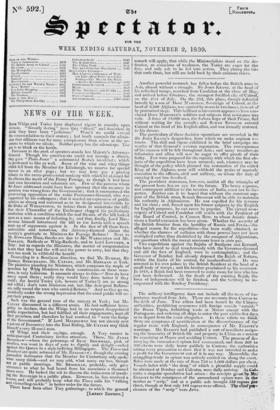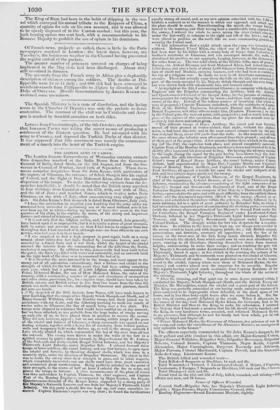The military intelligence does not include all the news of
im- portance received from Asia. There are accounts from Canton to the 27th of June. Two edicts had been issued by the Chinese authorities, prohibiting commerce with foreign vessels "outside" the Bocca Tigris, forbidding trade at Macao except with the Portuguese, and ordering all ships to enter the port within five days• or to depart from the coast altogether. In these edicts we think' there are symptoms of mortification at the discontintiance of the' regular trade with England, in consequence cf Mr. EidaoTT's. warnings. Mr. ELLIOTT had published a sort of manifesto assign- in the insecurity of British life and property in China as a reason' for remaining at Macao and avoiding Canton. The process of de- stroying the surrendered opium had commenced, and from 200 to :300 chests were daily burnt publicly in Canton; the authorities taking every precaution to show that it was not intended to make a profit for the Government out of it in any way. Meanwhile, the smuggling-trade in opium was actively carried on along the coast. Sales were made at the rate of from 750 to 1,000 dollars per chest. Vessels laden with " the drug," of which a plentiful supply could be obtained at Bombay and Calcutta, were daily arriving. At.C,447,-
elate a singular speculation had arisen : the receipts giveri"., •• Er.moTT to the consignees of the surrendered opium were in the market as "scrip," and at a public sale brought 3507rupeewiter chest, though at first only 189 rupees were offered. Tht chief- chasers of the "scrip" were Jews.
The King of Siam had been in the habit of shipping in the ves- sel which conveyed his annual tribute to the Emperor of China, a quantity of opium for sale on his own account, and it was allowed to be openly disposed of in the Canton market : but this year, the junk bearing opium was sent back, with a recommendation to his Siamese Majesty to prohibit the use of opium in his dominions.



























